From struggle to dignity: The stories behind Lions garden stalls
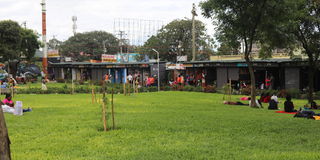
A section of the stalls at Lions garden in Nakuru city. Photo taken on May 14,2025.
In the heart of Nakuru city, just off the bustling Mburu Gichua Road, a quiet but meaningful transformation is reshaping the lives of everyday service providers at Lions Garden.
What was once a chaotic line of makeshift stalls clinging to the roadside has now become a structured and dignified work environment inside the garden walls, a long-awaited shift for shoe shiners, nail polish technicians, and street photographers.
For years, these traders operated outside the wall of Lions Garden, squeezed onto narrow pedestrian paths and exposed to the dust and danger of the busy road.
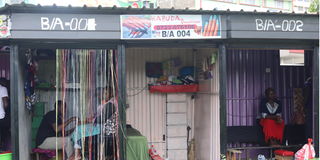
Traders inside stalls built at Lions Garden in Nakuru city on May 14,2025.
With no shelter from the scorching sun or pounding rain, their stalls were vulnerable and their businesses constantly disrupted.
But now, this changed after they occupied the stalls built inside the Garden.
The development of the stalls wasn’t without controversy. A legal battle between environmentalists and the county over the use of public green space delayed construction for months.
Among those who have witnessed this transformation first hand is Bernard Mbugua, vice chair of the shoe shiners at the Garden.
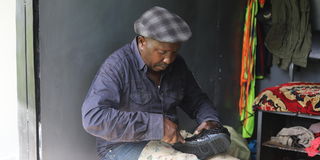
Vice chair of the shoe shiners at Lions's Garden,Bernard Mbugua mends a shoe for his customer during an interview on May 14,2025.
“It cost me about Sh70,000 to build my structure but I am glad I am now a proud owner of a stall in town,” Mbugua says
He reflects on his difficult past with a smile.
“I have worked under the scorching sun and rains since 2016. Every day I paid Sh20 for storage and Sh50 for transporting my work tools. That was the life we lived for years. But now, things have changed for me and the 12 shoe shiners working inside the Garden.”
A few stalls away, Peter Muiruri, chairman of the nail polish technicians, shares how the dusty roadside conditions once limited their services and professionalism.
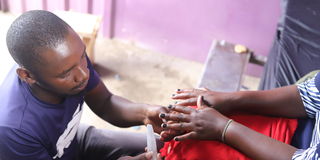
Peter Muiruri, chairman of the nail polish technicians, works on a client during an interview on the benefits of the stalls on May 14,2025.
“Before, we could not apply gel polish properly. We were right by the road, and the dust made it difficult. Clients would shy away from us because it didn’t look clean or professional,” he explains, further mentioning he can now take home sh 1,000 in a day after the move.
Now, with 23 nail technicians operating from within the renovated garden, the difference is clear.
“Each of us used around Sh120,000 to develop our stalls,” Muiruri says. “It was an investment that gave us a proper place to work. This renovation has brought us dignity. We now serve clients in peace and comfort and that has expanded our business.”
Photographers, too, have benefited from the new workspaces.
Daniel Karanja, popularly known as Mwalimu and chairman of the Lion’s Garden photographers, says the transformation has boosted client confidence and changed how they operate.
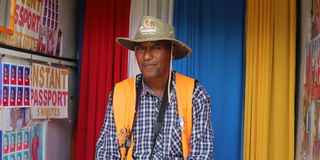
Daniel Karanja, chairman of the Lion’s Garden photographers, during an interview on the benefits of the stalls on May 14,2025.
“Before, you would take a client’s picture and rush off to develop it. Some would question whether you would actually come back,” Karanja says. “Now, we bring clients to our stalls, take the pictures, and instantly give them their photos. It has built trust.”
He adds that having a permanent workspace has helped them protect their equipment.
“Our machines, like printers, are no longer suffering from the wear and tear caused by constant transportation to storage facilities. Now everything is safe, and service is more efficient.”
Karanja, who started photography in 1990 adds that the transformation of Lions Garden is more than just a facelift for a public park.
It represents recognition of the hardworking traders who keep the city moving and a step toward integrating informal workers into the formal fabric of urban life.
He however acknowledges that the challenges remain customer traffic which is still picking up slowly. But for many, the dignity of having a permanent, clean workspace in the city centre is already a victory.
“We now work with pride,” says Karanja. “That makes all the difference.”


